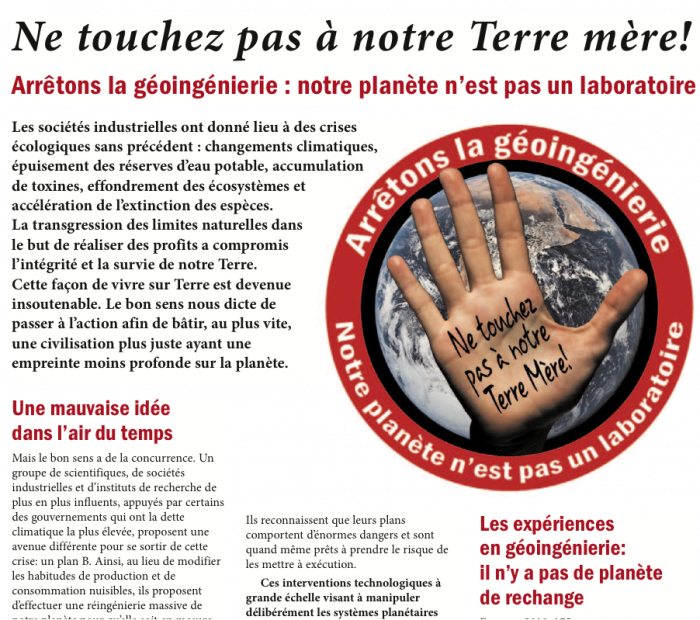This case study illustrates how a key pharmaceutical ingredient, shikimic acid – traditionally derived from star anise cultivated by Chinese farmers – can be rapidly replaced by a new technological production process. Using synthetic biology, shikimic acid is now being produced commercially in drug industry fermentation tanks. The transition took less than a decade. Shikimic acid is just one example of a raw material that may be affected; it is conservatively estimated that at least 50% of today’s commercial pharmaceutical compounds are derived from plants, animals and microorganisms. No inter-governmental body is addressing the potential impacts of synthetic biology on the conservation and use of biodiversity and on the livelihoods of those who depend on agricultural export commodities (including high-value flavors, fragrances, essential oils, etc). The Convention on Biological Diversity is the most appropriate forum to address this new and emerging issue.
Briefings

Plant-derived Ingredients and Synthetic Biology

The case for Technology Assessment
Does establishing a UN facility for technology assessment politicize science? Some agencies and treaties have subsidiary scientific bodies and some of these have been accused of allowing governments to interfere in their scientific work. However, one of the biggest changes since the 1992 Earth Summit has been the transformation of publicly-funded science to work in the service of private industry.
The Case for Technology Assessment
Although Rio+20 negotiators are discussing marine applications of geoengineering (so-called “ocean fertilization”) in the context of climate change and technological “quick fixes,” the wider issues of geoengineering, including so-called solar radiation management, are not being discussed. The UN Convention on Biological Diversity established a de facto moratorium on all forms of geoengineering in 2010. Nevertheless, some governments are continuing to look toward technological methods of blocking or reflecting sunlight and other planetary system adjustments. Rio+20 should make a firm statement banning geoengineering to prevent a handful of countries -- a new “coalition of the willing” from taking the Earth’s thermostat into their own hands.

Synthetic Biology's Impact on livelihoods and Sustainable USe of Biodiversity
Due to problems with scale-up, some synthetic biology companies are shifting focus away from biofuels to high-value / low-volume products – especially compounds found in plants (e.g., essential oils, flavours, fragrances, colourants and pharmaceuticals) – which are traditionally cultivated by farming communities in the global South.
If commercially viable, synthetic biology’s patented organisms have the potential to de-stabilize natural product markets, disrupt trade and eliminate jobs.with far-reaching impacts on agricultural economies.

The Case for Technology Assessment
International efforts to address the food, energy and climate crises give technology a central role to play. While some technologies may offer potential solutions to specific problems, decades of accelerating technological development and deployment have done little to mitigate climate change, and, in many cases, have made problems worse.
Now, new high-risk technologies, ranging from the very small (synthetic biology, genomics, nanotechnology) to the very large (geoengineering), are rapidly developing. Their promoters promise that these technologies are key to solving climate change,
world hunger, energy shortages and biodiversity loss. The precautionary principle and social and economic impacts are often ignored in the rush to deploy the latest technofix, marketed as socially useful and cutting edge, such as “climate-smart agriculture” or “next-generation biofuels.” Without the strict application of the precautionary principle, and a transparent and participatory form of technology assessment, new technologies could wreak even more havoc on a fragile planet that is already under immense strain due to reckless and unsustainable forms of production that serve the few at the expense of the many.

Synthetic Biology
This submission examines the potential impacts of synthetic biology and its relevance to
the three objectives of the Convention on Biological Diversity: the conservation and
sustainable use of biodiversity and the fair and equitable sharing of benefits arising from
the utilization of genetic resources.
Synthetic biology broadly refers to the use of computer-assisted, biological engineering to
design and construct new synthetic biological parts, devices and systems that do not exist
in nature and the redesign of existing biological organisms. While synthetic biology
incorporates the techniques of molecular biology, it differs from recombinant DNA
technology.
SBSTTA must not defer its consideration of synthetic biology as a new and emerging issue
requiring governance. Synthetic biology is a field of rapidly growing industrial interest. A
handful of products have reached the commercial market and others are in pre-commercial
stages. OECD countries currently dominate synthetic biology R&D and deployment, but
basic and applied research is taking place in at least 36 countries worldwide. Many of the
world’s largest energy, chemical, forestry, pharmaceutical, food and agribusiness
corporations are investing in synthetic biology R&D. Current applications of synthetic
biology focus on three major product areas that depend heavily on biomass feedstock
production processes: 1) biofuels; 2) specialty and bulk chemicals; 3) natural product
synthesis.

Tackling Technology: Three Proposals for Rio
he most dramatic technological transformation in history – involving information technologies, biotechnologies and engineering – has occurred since the first Rio Earth Summit in 1992; during the same period, however, governments have systematically downsized or eliminated their capacity to understand science and monitor technologies. While technology has thus far played an extraordinarily prominent role in preparatory documents for Rio+20, technology’s potential contribution to sustainable development and/or new Green Economies cannot be realized as long as the world lacks trusted and transparent mechanisms – at global, regional and national levels – for technology evaluation. The absence of such mechanisms incites distrust and invites disaster.
International effort to address the food, energy and climate crisis tend to regard technology as an important part of the solution. This optimism about technology also prevails in debates around the Green Economy and international environmental governance. And of course technology does hold some potential solutions to some important problems. However, two decades of accelerating technological development and deployment, in the context of massive trade and investment liberalization, has left the globe in far worse straits than it was when the very concept of sustainable development was in its infancy. And now, it is time for a technological te-think. New high-risk technologies, ranging from the very small (synthetic biology, nanotechnology) to the very large (geoengineering), are rapidly developing. Their promoters promise that they hold the keys to solving climate change, world hunger, energy shortages and biodiversity loss and the precautionary principle and social and economic impacs are often ignored in the rush to deploy the latest technofix.

Recommendations for CBD Delegates
As the Conference of the Parties (COP) to the Convention on Biological Diversity (CBD) ponders guidelines for considering new and emerging issues that may have implications for biodiversity – and struggles to adopt a protocol on access and benefit sharing (ABS) – researchers in synthetic biology are developing the capacity to construct synthetic life forms. The repercussions for biological diversity are unknown but could be devastating. Natural organisms, too, may be “tweaked” using synthetic biology to allow for patent monopolies beyond the reach of state sovereignty or of indigenous peoples.

Stop Geoengineering - Our home is not a laboratory
Industrial societies have produced unprecedented ecological crises: climate change, depleted fresh water, build-up of toxins, collapse of ecosystems and accelerating species extinction. The transgression of natural limits for private gain has compromised the integrity and survival of our living planet, Mother Earth. This way of living on the Earth has become unsustainable. Common sense says we must act to build a fairer civilization, one that steps more lightly on the planet – and fast.
